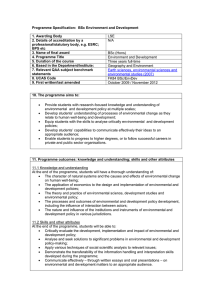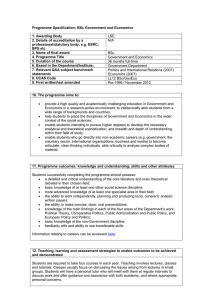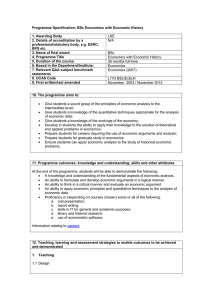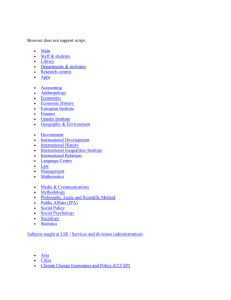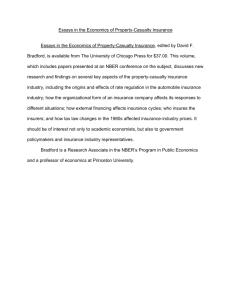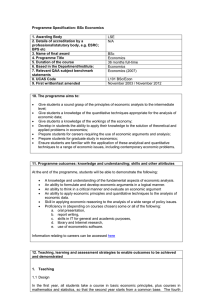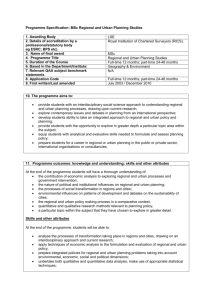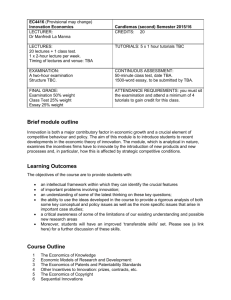Programme Specification: BSc Environmental Policy with
advertisement
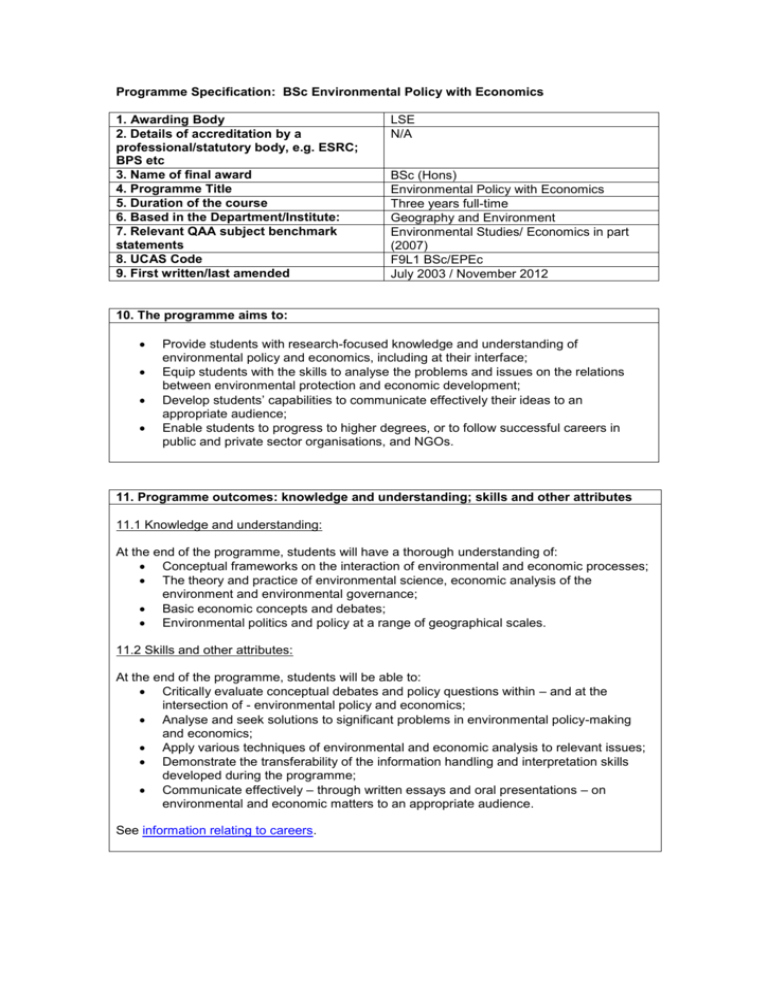
Programme Specification: BSc Environmental Policy with Economics 1. Awarding Body 2. Details of accreditation by a professional/statutory body, e.g. ESRC; BPS etc 3. Name of final award 4. Programme Title 5. Duration of the course 6. Based in the Department/Institute: 7. Relevant QAA subject benchmark statements 8. UCAS Code 9. First written/last amended LSE N/A BSc (Hons) Environmental Policy with Economics Three years full-time Geography and Environment Environmental Studies/ Economics in part (2007) F9L1 BSc/EPEc July 2003 / November 2012 10. The programme aims to: Provide students with research-focused knowledge and understanding of environmental policy and economics, including at their interface; Equip students with the skills to analyse the problems and issues on the relations between environmental protection and economic development; Develop students’ capabilities to communicate effectively their ideas to an appropriate audience; Enable students to progress to higher degrees, or to follow successful careers in public and private sector organisations, and NGOs. 11. Programme outcomes: knowledge and understanding; skills and other attributes 11.1 Knowledge and understanding: At the end of the programme, students will have a thorough understanding of: Conceptual frameworks on the interaction of environmental and economic processes; The theory and practice of environmental science, economic analysis of the environment and environmental governance; Basic economic concepts and debates; Environmental politics and policy at a range of geographical scales. 11.2 Skills and other attributes: At the end of the programme, students will be able to: Critically evaluate conceptual debates and policy questions within – and at the intersection of - environmental policy and economics; Analyse and seek solutions to significant problems in environmental policy-making and economics; Apply various techniques of environmental and economic analysis to relevant issues; Demonstrate the transferability of the information handling and interpretation skills developed during the programme; Communicate effectively – through written essays and oral presentations – on environmental and economic matters to an appropriate audience. See information relating to careers. 12. Teaching, learning and assessment strategies to enable outcomes to be achieved and demonstrated 12.1 Knowledge and understanding Teaching and learning strategies: Students acquire their detailed knowledge and understanding of the course through lectures, classes and guided independent study. Students take four courses a year. Most courses require three or four assessed class assignments (e.g. essays and presentations), which provide feedback to students on their level of knowledge and understanding. Many of those involved in teaching the programme are at the forefront of research in both environmental policy and economics: as such, students have direct insight into current thinking and recent research findings. This aspect of provision is further enhanced through the array of LSE public lectures, which include lectures from senior national and international policy-makers, politicians and researchers in these and related fields. All course reading lists are regularly updated: they include hard copy and electronic references to current research and other primary sources (e.g. official documents and nongovernmental organisation sources). Assessment: A variety of formative and summative assessment techniques are employed to gauge the development of relevant knowledge and understanding: formative assessment centres on class work and feedback from class teachers and, where appropriate, course tutors. Summative assessment methods testing knowledge and understanding feature, depending on the course, one or more of the following - three hour unseen examination, course work essay and field-based project work, independent research project. 12.2 Skills and other attributes Teaching and learning strategies: Skills are developed through guidance and feedback from class teachers and tutors in the context of: Regular lectures; Regular class work, class presentations and the preparation of course essays; One-to-one tutorials; Field-based observation and interpretation; The appropriate use of electronic information sources; Courses in mathematical and economic techniques; The option to plan, conduct and write up an independent research project. Assessment: Formative assessment of skills mainly takes the form of feedback of class tutors on written and presentation-based assignments. This is central to student development in support and development of lecture material. Most courses in the Department of Geography and Environment require the undertaking of a coursework assessed essay, which tests intellectual skills combined with independent study competencies. Feedback is provided to students on coursework assessed essays. Summative examinations also test essay-based intellectual skills, but in the context of independent recall and time management competencies. Field-based project work tests field observation and interpretation skills. Students have the option of undertaking an Independent Research Project, which tests the ability to plan, conduct and write up an environmental-economic investigation conducted on an individual basis. 13. Programme structures and requirements, levels, modules and awards: BSc Environmental Policy with Economics programme regulations Additional information 14. Criteria for admission to the programme GCSE pass at grade A in Mathematics is expected; A level Mathematics is required at grade A; Usual standard offer: GCE A level: grades A A B; International Baccalaureate: Diploma with 37 points including grades 6,6,6 at Higher level; There are requirements for applicants who have not been taught in English before: GCSE; 7.0 in IELTS; Grade C IGCSE, Grade 6 Cambridge Certificate 1119, Pass grade NEAB. 15. Indicators of quality RAE Rating 2008: 70% of the department’s research was judged as either worldleading or internationally excellent. The LSE Careers Centre website provides data on career destinations of LSE graduates. 16. Methods for evaluating and improving the quality and standard of teaching and learning Courses within the degree programme are subject to student feedback, both through regular student-staff liaison committee meetings and the annual student survey; Issues about standards are considered by Departmental and School examination boards; The School’s Undergraduate Studies Sub-Committee and Teaching, Learning and Assessment Committee oversee the quality and standard of undergraduate degree courses and programmes, ensuring that any changes are compatible with developments elsewhere in the School; TLAC review of the Department once every five years; Departments review their programmes according to their own system of periodic review; Course teaching surveys conducted by TQARO.
